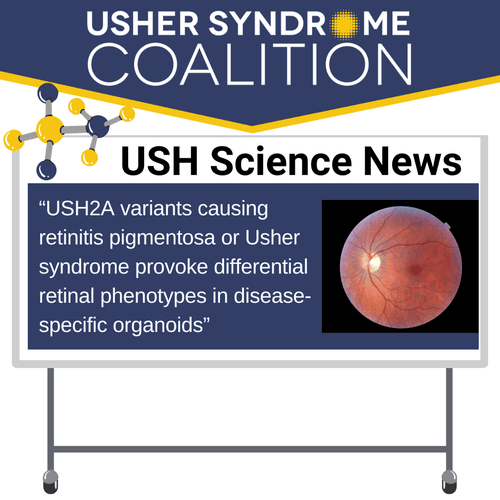Grounded in Science
A balance of research news and well-being for the Usher syndrome community.
Happy April! March was incredibly full with coordinating our third group advocacy trip to Capitol Hill. In a collaborative Usher Syndrome Coalition initiative led by Krista Vasi (Executive Director), Peggy Borst (Usher Syndrome Society Board Member), and Susie Trotochaud (Founder of Usher 2020 Foundation), 25 USH Champions took to Capitol Hill advocating for a cure for Usher syndrome!
We asked 35 Members of Congress for their support to increase much-needed NIH/NEI funding in excess of $50,000,000 for the U.S.H.E.R. (Usher Syndrome Healthy Eye Restoration) Research Program. A BIG thank you to Peggy’s friend, Mary Newcomb and her father, former Texas Congressman, Greg Laughlin, with Pillsbury Winthrop Shaw Pittman LLP who is representing the Usher Syndrome Coalition pro bono. He secured successful meetings with key appropriations members, including Appropriations Chairwoman Kay Granger and LHHS Subcommittee Chair Robert Aderholt.
If you’re interested in making your voice heard and helping ensure Usher syndrome research gets the federal funding it deserves, sign up to become an USH Champion.
USH Connections Conference | July 19-20, Rochester, NY + Online
Hosted in partnership with the National Technical Institute for the Deaf
We are in full swing planning our USH2024 conference! Have you signed up yet? Register here.
Have you joined the Usher Syndrome Coalition Discord Community Server? It’s a safe place for the community to connect with each other. Join here: https://discord.gg/czwHGaDu7W
Research Spotlight
SparingVision Reaches Final Dose Escalation Step in PRODYGY Trial with SPVN06 for retinitis pigmentosa
SparingVision is a clinical-stage genomic medicine company working to create gene therapies for the treatment of inherited retinal diseases, such as retinitis pigmentosa (RP). They have several products in their research pipeline, one of note being SPVN06, which is their lead gene-agnostic investigational gene therapy for RP. This product aims to slow down the disease progression of anyone affected with a rod-cone dystrophy, focusing primarily on mid-stage RP. Retinitis pigmentosa is considered a rod-cone dystrophy disorder because the genetic mutation affects the rod functions first with subsequent cone damage later on.
In late January, SparingVision announced that its PRODYGY Phase I/II clinical trial for SPVN06 has progressed to the final dose cohort of the dose escalation phase. In this press release, SparingVision shared that their phase 1 trial showed a “strong safety and tolerability profile,” allowing them to move forward to the next clinical trial phase.
After completing the third and final cohort of Part 1, the PRODYGY trial will move to Part 2, examining two doses of SPVN06 doses and one untreated arm, with new clinical sites opening in the United States. We should learn more about the primary endpoint of the PRODYGY Phase I/II trial in the second half of 2025.
Check out our Current USH Research page specific to USH subtype as well as gene-independent therapeutic approaches.
In Case You Missed It: Science News Feature
USH2A variants causing retinitis pigmentosa or Usher syndrome provoke differential retinal phenotypes in disease-specific organoids
August 7, 2023: USH2A is the most common gene associated with autosomal-recessive retinitis pigmentosa (RP) and Usher syndrome (USH). However, the gene is very large and there are many variants that can alter the clinical phenotype, leading to either RP or USH, thus making diagnosis challenging.
A group of European researchers in France, Germany, and the Netherlands, successfully developed three human disease-specific models for non-syndromic RP and Usher syndrome using retinal organoids. They can now identify and validate specific phenotypes of multiple RP and USH individuals using these three distinct organoid models.
What this means for Usher syndrome: This ability to identify RP and USH phenotypes from USH2A variants opens new doors for researchers to use these organoid models to study other USH2A variants in more detail to better understand the disease mechanism as well as therapeutic potential.
For more science news, check out our Science News page, organized by treatment approach and type of Usher syndrome.
DISCLAIMER: The Usher Syndrome Coalition does not provide medical advice nor promote treatment methods. USH Science News is intended to help summarize more complex literature for the community to use at their own discretion.
ON WELL-BEING: Managing Stress
April is Stress Awareness Month. You probably don’t need to be told that learning to manage stress benefits your health. In the Usher syndrome community, additional stressors may be placed on caregivers and the individuals living with Usher syndrome themselves...
USH Life Hack of the Month
(Send your USH life hacks to info@usher-syndrome.org.)
“When not able to see the full view with minimal scanning, I use my phone camera to see the bigger picture. The phone camera automatically shrinks the full view.” -USH Volunteer








